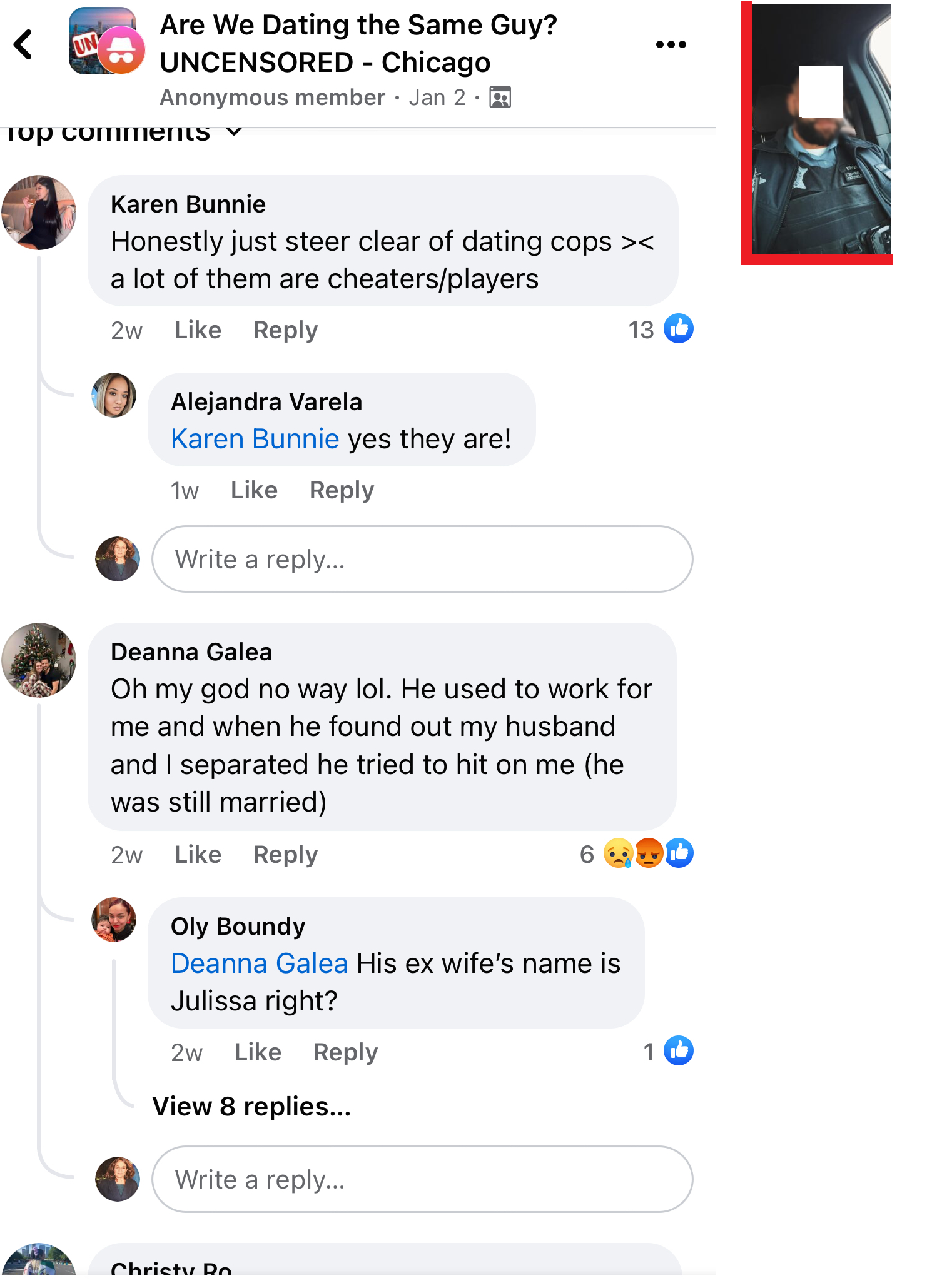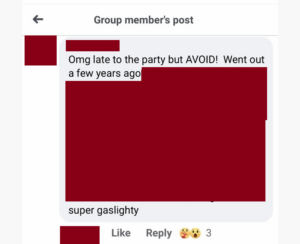‘Are we dating the same guy’ federal lawsuit moves forward
By: Steve Schuster, [email protected]//March 19, 2024//
‘Are we dating the same guy’ federal lawsuit moves forward
By: Steve Schuster, [email protected]//March 19, 2024//
A preliminary hearing has been scheduled for April 8 in a Federal lawsuit against 27 women who posted negative comments about a man in the private Facebook group ‘are we dating the same guy.’
Long time former Assistant Illinois Attorney General and Cook County States Attorney Daniel Nikolic is representing Nikko D’Ambrosio in the civil case.
During an interview with the Wisconsin Law Journal on March 18, 2024, Nikolic said the original civil case was dismissed by a federal judge due to a jurisdictional issue, however, the case was refiled a few hours later, and has a preliminary hearing now scheduled in April.
According to Nikolic, he attempted to resolve the matter prior to commencing litigation by sending letters via certified U.S. mail to the Facebook group moderators with a cease and desist, demanding the group take down the false and damaging Facebook comments made by 27 women.
“They (the moderators) ignored my letters,” Nikolic said, noting he then filed the federal lawsuit.
Nikolic said he remains optimistic that his client and other men who have had similar experiences will seek justice from what he calls an underground Facebook group ‘are we dating the same guy,’ which has chapters across the country.
“This whole secret society knows all of these lies about men,” Nikolic said noting a recent call from a Washington Post reporter who was anticipating this lawsuit for months.
According to Nikolic the groups provide little recourse for the male victims of lies and exaggerated gossip that damages reputations.
“You can get graded on a date, and you get a bad grade, then all of a sudden no one wants to date you based on one person’s opinion, even if it’s a lie. Then men have no recourse,” Nikolic said, noting “If had gotten judged on every date I’ve been on, I would never leave the house.”
“God-forbid I do something wrong and not even know what I did, and they go on the internet and shame me,” the former prosecutor added.
As previously reported, the Feds got Al Capone in a similar fashion, and they may have just nabbed another Chicago man for similarly alleged criminal tax activity.
Although D’Ambrosio was recently convicted for tax fraud in the same federal courthouse he is suing dozens of women for defamation, the civil case is moving forward, Nikolic said noting his client is “still a victim.”
The criminal case says D’Ambrosio underreported income he “earned” while distributing “sweepstakes” gaming machines for a company with ties to Chicago mob figures.
According to court documents obtained by the Wisconsin Law Journal, D’Ambrosio’s case suing 27 women claims they posted false and damaging negative reviews about him damaged his reputation. The lawsuit also names admins to the group who reside in New York, as well as Meta, the parent company of Facebook.
According to defamation attorney Brian Spahn with Godfrey & Kahn in Milwaukee, the plaintiff will have a difficult time recovering damages from Meta and/or Facebook. However, time will tell about the other defendants named in the suit.
“When it comes to social media, Section 230 of the Communications Decency Act provides immunity to social media platforms for statements made by third-parties,” Sphan said, noting this is the case in most jurisdictions.
Nikolic said he believes the law was appropriate in the 1990s when it was first enacted, but needs to be updated.
“In 2024 giving immunity to Facebook is bullsh*t,” Nikolic said, noting the social media platform is notorious for its algorithms of moving content around to prioritize visibility of stories based on Meta’s profits.
“They have to be accountable to somebody,” Nikolic said, noting he is not afraid of taking on big corporations like Meta.
“We recently also sued a university and the Chicago Bears for discrimination,” Nikolic said, noting his firm Trent Law Firm is handling the matter. Marc Trent is the firm’s founding partner.
The civil lawsuit further alleges defendants acted with willful misconduct, malice, fraud, wantonness and oppression.
In the civil Illinois case, the plaintiff is seeking $75,000 in damages and injunctive relief.
Apparently, no man is immune from being called out in the ‘Are we dating a same guy’ Chicago Facebook group, as government officials and police officers have also been named in the group, even without any criminal misconduct. Although many of the posts have since been deleted, some screenshots are still floating around the web.

Chicago police officer screenshot posted in the Are We Dating The Same Guy Chicago Group. NOTE: The Wisconsin Law Journal blurred the officer’s face.
Wisconsin Defamation law
If a similar post had occurred in Wisconsin, what options would be available to Wisconsin law enforcement or prosecutors if they themselves or others were named in a Facebook post?
In the recent post in the Facebook group “Are we dating the same guy Chicago” with a picture of a Chicago police officer in uniform, a woman with a likely fictitious name “Karen Bunnie,” commented on the photo, “Honestly, just steer clear of dating cops, a lot of them are cheaters and players.”
Chicago defamation attorney Joe Hoolihan (Goldberg Kohn) said, “there can sometimes be liability for a general statement about a group of people if it is clear from the context that the speaker is actually making a factual claim about a specific person. Here, the commenter is likely safe from civil liability since it appears from the context that she was not targeting this police officer specifically.”
Chief Deputy Milwaukee District Attorney Kent Lovern said although the Milwaukee County District Attorney’s office receives few referrals for defamation, there are several other statutes applicable to anyone posting damaging statements to social media.
“If someone depicts images of another person through digital technology (including social media) that can charged as a misdemeanor or a felony,” Lovern said, noting it depends on the facts of the case.
During an interview with the Wisconsin Law Journal, Lovern said, “There are more detailed statutes available for those specific uses of technology.”
If the statement posted on social media is mostly false, but still has “a grain of truth,” Lovern said there are other statutes people can be charged under that would be more appropriate than a defamation statute.
The Milwaukee County District Attorney’s office said roughly 42% of the small number of cases referred for defamation have had charges that followed. However, to date, Lovern noted social media defamation cases have not been prosecuted under the defamation statute in Milwaukee County, yet.
According to Milwaukee Defamation Attorney Stephen E. Kravit (KRAVIT ▪ HOVEL & KRAWCZYK, s.c.), “there are three powerful Wisconsin statutes” that are relevant to seeking justice for damaging statements made in the ‘Are we dating the same guy’ Milwaukee/Madison Facebook group.
Both Hoolihan and Kravit agreed that pursuant to Wis. Stat. 942.01, defamation is a crime in the state of Wisconsin and is a misdemeanor. Both Hoolihan and Kravit, as well as Wisconsin district attorneys, said to date there is not much case law in Wisconsin for prosecuting such a crime (as defamation from a Facebook post).
Kravit said the Wisconsin defamation law is very broad and allows a lot of prosecutorial discretion.
However, according to Kravit, a second statute is even more powerful for prosecutors as justice can be sought for defamation through a harassment statue.
“A much more powerful statute is Wis. Stat. 947.013, which is applicable to online harassment,” Kravit said.
“If the intent of the Facebook comments is to intimidate someone, they can be prosecuted under 947.013,” Kravit said.
Depending upon the severity of the comment, the person authoring the comment could face felony charges in Wisconsin, he said.
However, a third, lesser-known Wisconsin statue can be successful when seeking justice for defamation, Kravit said.
“It’s that statute no one knows about,” he said.
“If someone dissimilates information whether true or false that humiliates someone, they are guilty of a felony,” Kravit said, noting “although the statute is on the books, it hasn’t been used often,” yet, anyway.
The Wisconsin Law Journal obtained a screenshot from the Milwaukee/Madison Facebook group ‘are we dating the same guy’ posted by a Wisconsin attorney.
When asked by Kravit if the victim of this post could sue for defamation for the “Super gaslighty” comment, Kravit said, “Assuming there is an accepted definition for gaslighting, the victim could sue for defamation if he could provide evidence the comment was made with malicious intent and that the post caused damages, such as loss of his job.”
When asked if the victim did not lose his job, but lost a second date because of the comment, could he seek damages, Kravit replied, “It was probably a benefit that he didn’t get a second date.”

If a Wisconsin attorney were to post a defamatory comment in the same Facebook group, not only would they be subject to the above statutes, but they could also face possible Office of Lawyer Regulation discipline, up to and including disbarment, a suspension or public reprimand.
The Wisconsin Law Journal reached out to the OLR and received the following response:
“OLR is unable to provide advisory opinions on hypothetical questions due to the risk of the appearance of bias of prejudgment in future cases.”
However, Milwaukee Attorney Stacie Rosenzweig (Halling & Cayo) who defends Wisconsin attorneys accused of misconduct, said depending on the nature of the Facebook group comment, attorneys could face a variety of different disciplinary actions at the OLR’s discretion.
According to Rosenzweig, under the Wisconsin Supreme Court Rule 20:8.4, it is professional misconduct for a lawyer to engage in conduct that the lawyer knows or reasonably should know is harassment on the basis of sex.
Additionally, Rosenzweig noted the character and fitness of an attorney to practice in Wisconsin and mentioned how SCR 20:8.4(g) is the rule discussing the attorneys’ oath, which incorporates offensive personality and 20:8.4(i) that talks about harassment on the basis of sex.
“Wisconsin rule 24.8(g) specifically addresses the attorney oath, which has various provisions prohibiting lawyers from engaging in an offensive personality. Communication that is derogatory to certain groups does fall under that rubric, depending on egregiousness of comment,” Rosenzweig said.
The Wisconsin Law Journal also reached out to the State Bar of Wisconsin and Marquette Law School professors to address the ethics of if attorneys who practice law then post false and damaging remarks about their clients or other individuals in the Facebook group.
Marquette Law Professors David Papke and Angela Schultz deferred questions to others who were not immediately available for comment.
Regarding the Chicago lawsuit, several women who posted to the group anonymously have been called out by name in the lawsuit.

In the wake of the Illinois case, will that open the door to other similar defamation cases in Wisconsin?
“With the publicity these Facebook groups are getting from the Illinois case, and as the groups’ membership and activity grows, it’s possible Wisconsin could see similar cases,” said Chicago attorney Hoolihan.
Proving Defamation in Wisconsin
Hoolihan said a Wisconsin plaintiff alleging defamation has the burden to prove the false statements were made intentionally, and actually harmed the plaintiff, causing damages.
“For example, if someone got a job offer rescinded because of a post in that group, there might be actual monetary damages that could be claimed in court. This assumes the plaintiff could prove that the post was the reason the plaintiff wasn’t hired,” Hoolihan said.
“Or if someone’s reputation was so thoroughly tarnished by a false statement that they could never find a date or romantic partner, or if their current romantic partner left them due to a false statement, that might be the type of reputational harm or emotional distress for which the law may provide a remedy.”
Hoolihan also noted while factual statements that are intentionally false and cause reputational harm are actionable, merely stating one’s opinion is considered protected speech under the First Amendment.
So, if someone posted they had a “boring conversation” with a particular individual, although that may influence someone’s decision not to date the individual, that is considered a safe opinion, freedom of speech, and is not actionable.
“Opinions are not factual. One needs a statement of fact that can be proven wrong to assess damages,” Hoolihan said.
In the Illinois case where a defendant called the plaintiff “awkward, and got clingy fast,” the defendant is expressing a subjective opinion, and therefore is not subject to redress for allegedly damaging the plaintiff’s reputation, according to Hoolihan.
“The true test is whether the speaker is expressing an opinion or making a statement of verifiable fact,” Hoolihan said.
Hoolihan also noted, “the statement has to be about the defendant. From a legal standpoint, a person cannot be damaged by a statement that is not directed at that person specifically.”
When asked if he would take a similar case in Wisconsin on a retainer or hourly rate, Hoolihan said it would be unlikely, but would depend on the facts in the case at hand.
Copyright infringement
Although the Illinois case focused on defamation, what about using someone’s private photos without their permission?
Is taking a screenshot of someone’s personal photos from a dating app and posting it to a Facebook group “fair use” or copyright infringement?
Milwaukee attorney Christina M. Lucchesi (von Briesen & Roper, s.c ) said, “Copyright protects original works of authorship fixed in a tangible form. In the case of a photograph, the author of the work is the photographer; the subject of the photo does not possess a copyright in the photograph.”
“If the photograph is a ‘selfie,’ the subject of the photo and the photographer are one and the same. The subject, in this case, would be the copyright owner, because s/he is also the photographer,” Lucchesi added.
There are a number of factors to consider.
“You really have to weigh multiple factors,” said Laura Lamansky, an attorney with Michael Best in Milwaukee, who specializes in copyright law.
Attorney Heidi R. Thole, who specializes in copyright law, is a shareholder at Reinhart.
According to Thole, “As an induvial in Wisconsin you have a right to be left alone, but that can go out the window when you post photos to dating app.”
According to Thole, Fair Use is taken by courts on a case-to-case basis, but when money gets involved such as the Gofundme that defendants have setup, that can weigh against or negates the defense.
According to legal experts, a misappropriation of an image could be claimed, since a for-profit angle was established as the defendants have set up the Gofundme page.
“There is some unpredictability even if you think you have a decent fair use claim,” Thole said.
Lamansky added, “It’s important to note that fair use is a not a positive right to use someone’s copyrighted work.”
There are some disadvantages to using a fair use defense, according to Thole.
“While it can be a powerful tool, you are almost starting on backfoot because it’s already a defense to an infringement,” Thole said.
According to both Thole and Lamansky, in some cases, the terms of service of the dating app dictate whether or not a plaintiff has an actionable copyright infringement claim.
“Most users of dating apps don’t read the fine print when uploading their images,” Lamansky said, noting that “many people unknowingly give up some of their rights.”
Lamansky and Thole both noted that each dating app or website has its own contract with users for how images may be used on or off the respective platform.
“At this point it becomes not a matter of copyright law, but a matter of contract law,” Lamansky said.
The attorney would need to review the terms of service with the respective dating app to determine if a breach of the contract occurred, and therefore copyright infringement.
Copyright infringement is not really at issue in the Illinois case, Lamansky said.
“It seems the real heart of the issue is emotional distress and reputational harm. Copyright law doesn’t get to the issue. If a photograph was found to be in violation of copyright law, the remedy would be to remove the posted photograph. However, that would not address the reputational harm that has already occurred,” Lamansky added.
Misappropriation of image
In a leaked post by a defendant named in the Illinois case, Paola Sanchez says she has created a Venmo account for her legal defense fund, which according to several defamation attorneys opens her up to other liability, for now monetarily profiting from the case.
As same Facebook group (with different local versions) has been subject to litigation across the country for issues ranging from libel and defamation to copyright infringement, prompting several of the groups to be shut down, a Virginia group also recently made headlines.
As previously reported by the Wisconsin Law Journal, a 30-year-old woman who confessed to killing her military spouse admitted to posting a comment two days earlier in a private Facebook group. Court documents revealed the entire incident was captured on video.
In a private Facebook group called “Are We Dating The Same Guy? | Virginia Beach / Norfolk / Newport News,” Christina Wang posted a photo of her husband along with the comment, “This is my husband Calvin. If you see him on this app or any of the others please know that he is MARRIED. And please let me know if he matches/chats with you.”
Calvin Wang was on active duty serving in the U.S. Navy. The couple had a 6-year old son.
Over the summer of 2023, Christina Wang allegedly was involved in an altercation with her husband, Calvin. Following the battery incident, where Christina slapped Calvin so hard that his glasses fell off his face, he reportedly told Christina to leave the home. Instead, Christina retrieved a firearm and shot her husband in the stomach and head, killing him.
According to other media reports, Calvin Wang had filed for divorce and later created a Bumble online dating profile, which Christina screenshotted and posted to the Facebook group. Calvin Wang had previously accused his wife of engaging in extramarital affairs, as a filing from the decedent’s attorney regarding the divorce accused his wife of engaging in extramarital affairs, to which Christina’s attorney at the time countered with a filing that claimed, “Plaintiff has condoned Defendant’s adulterous acts and thus Plaintiff cannot use adultery as a ground for Divorce.”
Law Enforcement Today reported, “Considering the background of adultery accusations, divorce proceedings and Christina’s self-proclaimed permission to engage in adultery, the now-accused murderer had bizarrely taken to a Facebook group to inquire whether or not her husband was being faithful mere days before his slaying.”


According to court records obtained by the Wisconsin Law Journal, Wang is currently in custody at the Virginia Beach City Jail and faces multiple charges for second-degree murder and use of a firearm in the commission of a felony. A Virginia judge ruled last Thursday that the case will go before a grand-jury trial on Feb. 28.
Roger Whitus, the attorney representing Christina, “fruitlessly attempted to argue that his client bore a history of anxiety and depression during the bond hearing.”
U.S. Navy officials released a statement following Calvin’s death.
“Our thoughts and prayers are with his family, friends, and coworkers during this time. This loss is felt personally by the people who served with him and by our Navy as a whole. Each Sailor is an invaluable part of our team and he is sorely missed. Grief counseling services and support are available through the chain of command and local chaplain. An investigation by the Virginia Beach Police Department is currently ongoing. Please direct all additional questions to Virginia Beach Police Department.”
Legal News
- Wisconsin attorney loses law license, ordered to pay $16K fine
- Former Wisconsin police officer charged with 5 bestiality felony counts
- Judge reject’s Trump’s bid for a new trial in $83.3 million E. Jean Carroll defamation case
- Dozens of deaths reveal risks of injecting sedatives into people restrained by police
- The Latest: Supreme Court arguments conclude in Trump immunity case
- Net neutrality restored as FCC votes to regulate internet providers
- Wisconsin Attorney General asks Congress to expand reproductive health services
- Attorney General Kaul releases update at three-year anniversary of clergy and faith leader abuse initiative
- State Bar leaders remain deeply divided over special purpose trust
- Former Wisconsin college chancellor fired over porn career is fighting to keep his faculty post
- Pecker says he pledged to be Trump campaign’s ‘eyes and ears’ during 2016 race
- A conservative quest to limit diversity programs gains momentum in states
WLJ People
- Power 30 Personal Injury Attorneys – Russell Nicolet
- Power 30 Personal Injury Attorneys – Benjamin Nicolet
- Power 30 Personal Injury Attorneys – Dustin T. Woehl
- Power 30 Personal Injury Attorneys – Katherine Metzger
- Power 30 Personal Injury Attorneys – Joseph Ryan
- Power 30 Personal Injury Attorneys – James M. Ryan
- Power 30 Personal Injury Attorneys – Dana Wachs
- Power 30 Personal Injury Attorneys – Mark L. Thomsen
- Power 30 Personal Injury Attorneys – Matthew Lein
- Power 30 Personal Injury Attorneys – Jeffrey A. Pitman
- Power 30 Personal Injury Attorneys – William Pemberton
- Power 30 Personal Injury Attorneys – Howard S. Sicula












